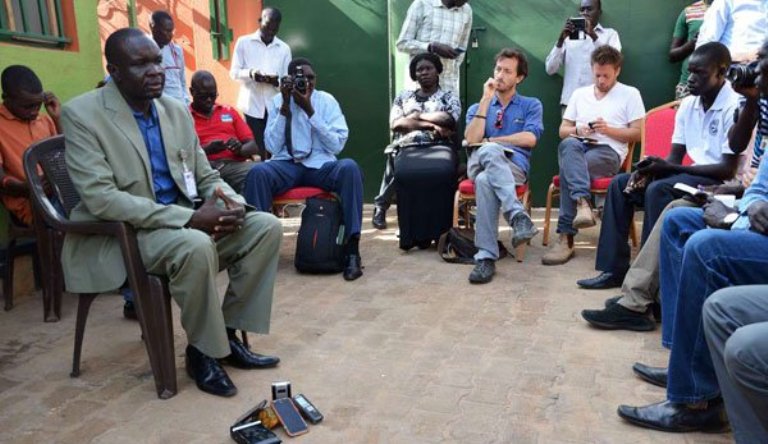South Sudan veteran journalist calls to lift ban on foreign correspondents

June 9, 2017 (JUBA) – A South Sudanese veteran journalist and the editor in chief of a daily newspaper in Juba has called for a reverse of a decision barring foreign journalists from entering and operating in the country.
“The country is in dialogue which requires media coverage. It is not the time to bar media from entering and operating in South Sudan. It is a time to allow them to come and report what they see so that they can give out correct information and help in disseminating information of the dialogue,” Alfred Taban, chairperson of Association for Media Development in South Sudan (AMDISS) told Sudan Tribune on Friday
The Veteran South Sudanese journalist was reacting to a decision by the South Sudan Media Authority (SSMA) banning unnamed 20 foreign journalists from entering or operating in the country for what it termed “unsubstantiated and unrealistic stories”.
The chairman of the regulatory agency, Elijah Alier, Thursday claimed that the banned journalists had often reported stories with the potential to incite hate and violence among the South Sudanese. Alier, who did not disclose any names, said the SSMA had issued over 200 permits to foreign journalists and media houses to operate in the country.
These journalists, he said, had filed stories that insulted or degraded South Sudan and its people. sometimes, he claimed, they incite violence rather than encouraging the public to embrace peace. these reports, he adds, undermines the provisions of the Media Authority Act.
Taban said the decision of the public funded Media Authority to ban foreign journalists was in favour of the government and not the country and so its actions may not be helpful and should be reversed.
“The media authority should not be a tool to stifle press freedom and media activities in the country. It should be the one to enhance a working relation between the government and the media instead o becoming part of the government. It should be a regulatory body but what it has done now will not help facilitate the smooth working relations between the media and the government. It will discourage foreign media to not enter South Sudan because they know they will not be protected and this will have an impact on the dialogue process. And it means there is something which the government wants to hide from the public,” said the veteran journalist.
Alier, however, admitted that foreign journalists can contribute to mobilising international community on the humanitarian issues in the country.
“Reporting about the humanitarian situation is acceptable. Such reports are helping South Sudan as they inform the world and the donor community,” he said.
Recently, the South Sudanese authorities have rejected to authorise foreign journalists working with international media agencies or services such as AFP, Reuters and Voice of America among others.
South Sudan is one of the countries in the world which has increasingly become repressive and dangerous for journalists, according to the Committee to Protect Journalists. Several journalists have died in the young nation.
(ST)
